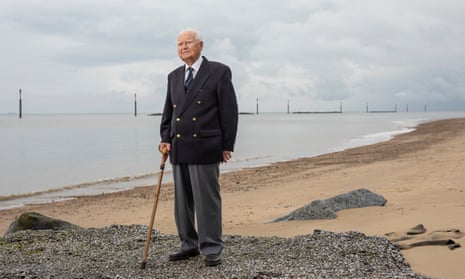I was 15 when I went to sea. When the second world war broke out, our school in Stockton-on-Tees was taken over by the civil service, and my headteacher allowed me to leave. He said to me: “Colin, everything is so upside down you won’t be missed.”
I trained for six months and joined SS Rio Azul, a cargo steamer, as a deck boy in the merchant navy. My first voyage was to Freetown, Sierra Leone, to collect iron ore for the war effort. On our journey home, we were escorted in a convoy of more than 20 ships by HMS Esperance Bay. Unfortunately the “wolf pack” – German U-boats – picked us up.
We lost ships every day of the journey. Eventually, the commodore of HMS Esperance Bay told the convoy to scatter – this would lessen the chance of being attacked. We were alone for two days before being torpedoed by a U-boat in the early evening of 29 June 1941. The ship went down in 50 seconds. You don’t know how fast you can run until it happens.
I climbed a short ladder and got on to the boat deck. The water was already at deck level. The boatswain said, “The lifeboats are smashed.” We only had rafts – two 45-gallon drums laced together with wooden batons. I grabbed the raft just as the stern of the ship went down. As I went under water, all I was thinking was: if this raft is tied to the ship, I’ll have to let go, because I haven’t got a knife to cut it away. But suddenly we were going up, and I resurfaced, clinging to the raft. It was dark. People called for help. One chap shouted: “How do you swim?” It was a bit too late to teach him. We ended up with 18 people on the raft or hanging from the sides. When the last shouts died away, there was silence.
The boatswain was in charge. We had a demijohn holding a gallon of fresh water and our ration was one capful – about three teaspoons – a day. We distributed a tin of powdered egg and one of molasses by dipping a stick in water, then in the powder, before licking the stick.
I remember wearing a vest, underpants and a life-jacket. The sun burned, so we took turns on the raft and in the water. Those in the ocean threw water over those on top. After three or four days, we saw smoke on the horizon from a passing ship. Morale rose, but we were very low in the water and had no flares. The smoke disappeared. Morale dropped to the bottom. We didn’t sing, and we didn’t talk much. We tried to save energy and stay calm. There were no arguments, although some people tried to get an extra helping of water. When a chap is dying your first thought is, give him some water; but if he’s dying, what the devil are you giving it to him for?
The head steward was in his 60s and he was the first to go over the side. A gunner drank seawater and he went daft and swam away. A young third officer shouted for his mother and then went over. I was going in for him, but the boatswain said, “Stay where you are – you can’t do anything for him.” Two others just disappeared without a word.It’s a hard thing to explain, but the feeling was just: “So-and-so’s gone, that’s bad luck.” I thought, “Oh gosh, I haven’t seen anything of life yet,” but I never gave up hope.
After 15 days on the raft, we saw smoke again. This time, I stood with seamen supporting me and waved an oar that held a cigarette tin. The ship’s lookout saw it glint in the sunlight. It was HMS Esperance Bay. We were so weak that their seamen had to carry us on to deck. The boatswain died when he got on to the ship. There were just eight survivors from the ship’s company of 42; I survived because I was young and fit. We had drifted 200 miles south of the Azores.
My parents were told my ship had been torpedoed and I was presumed lost at sea. On the day I came home, my brother opened the door and slammed it shut: he thought he’d seen a ghost.
I received a small pension but became bored at home, and so I spent the next 11 years at sea. For years after being on the raft, I would wake at night not knowing where I was and only that I had to get out. I’d get up and be soaked in perspiration. I suffered with that for a long time, but I thought I was going crackers so I didn’t tell anybody.
I married Margaret, we had two children and I’ve had a good life. I was lucky. But we haven’t had many holidays at sea. If they want me to go, they’ll have to pay me.
As told to Patrick Barkham
Do you have an experience to share? Email experience@theguardian.com

Comments (…)
Sign in or create your Guardian account to join the discussion